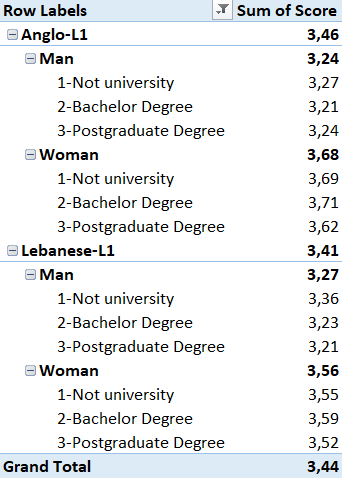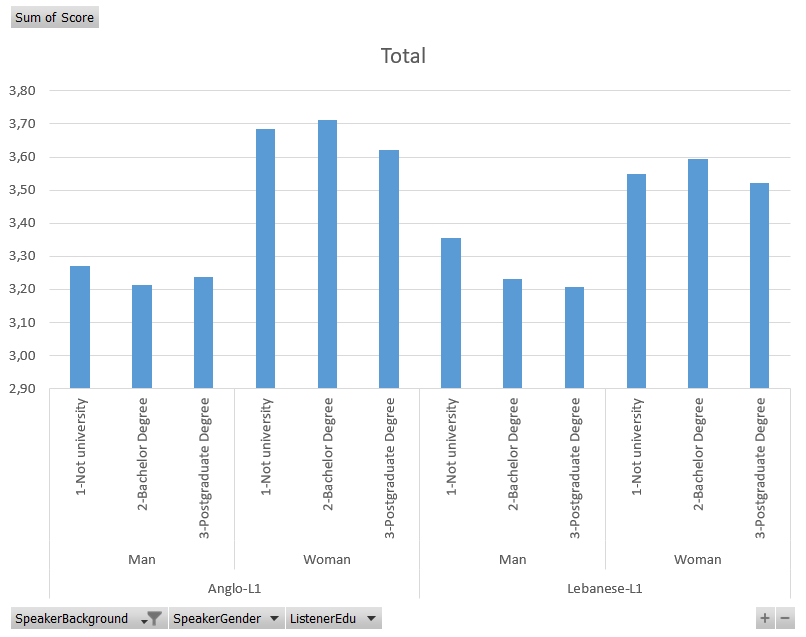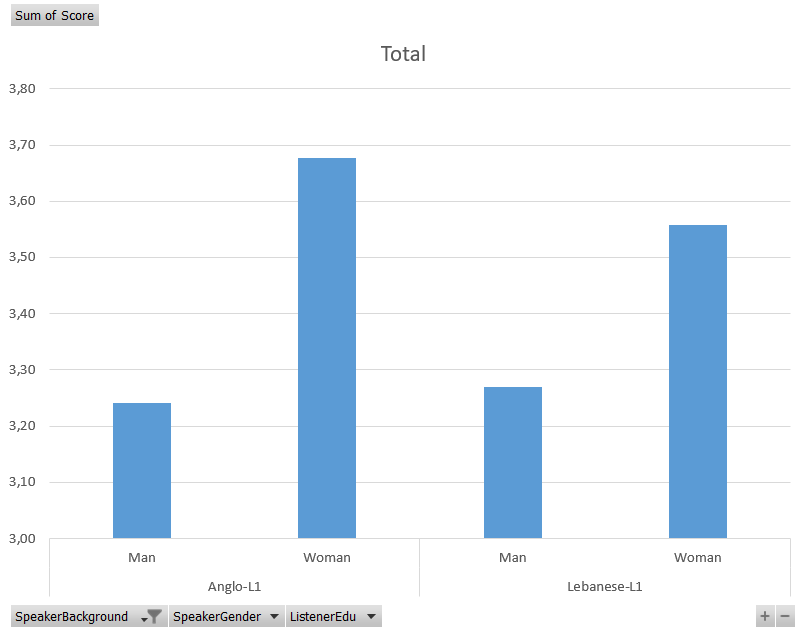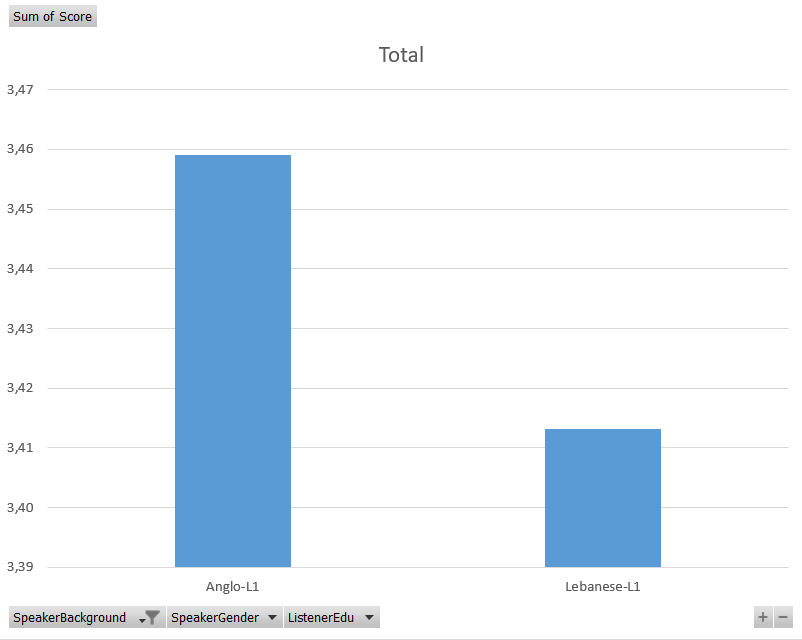Introduction
Many aspects influence people’s ability to communicate in the language they speak in terms of their accents. This report will cover the question of whether a person is a good fit for the job position in accordance with the survey conducted among different people. It was done while considering such variables as the speaker’s background, gender, age, listener education, and others. Three main variables were chosen to construct tables and conduct a profound analysis of the obtained data.
Variables for Analysis
The first variable that was chosen to analyze the data is the speaker’s background. Among five main variants, Anglo-Australian and Lebanese Australian Backgrounds of Speakers were selected. This choice will allow one to compare people of different roots and cultures while considering their English accents and answering the first chosen question of whether they fit well for the job position.
As the primary indicator of the participants’ answers, the scores variable was chosen and implemented in the tables. The scores are from one to five according to speakers’ answers. Therefore, the main question the report aims to answer is which variables significantly impact people’s accents and language skills. As the primary hypothesis, it will be essential to state the overwhelming influence on the participants’ language accents is caused primarily by their backgrounds, such as Anglo-Australian or Lebanese-Australian.
The second selected variable is connected with participant-related demographic information, which is Speaker Gender. This variable is essential to understand how the gender aspect influences the ability of speakers to fit in a good-to-job position according to their English skills and accent. Female and male indicators were added to the tables to present comprehensive statistics concerning the gender aspect.
In addition, as the third variable that was essential for the study, one should name listener education. This point serves as a vital aspect in understanding how listener’s skills and educational background impact their perception of speeches. Consequently, three variants of this variable were implemented: not university, bachelor’s degree, and postgraduate degree. Each of these points was correlated with the gender variable and, further, with the Speaker’s Background variable.
In general, all the above-mentioned points allowed one to construct a profound understanding of how particular aspects influence people’s ability to communicate in the English language. In addition, this selection of variables was vital to consider the chosen question of a good fit for the job position while stating the scores.
Data and Quantitative Analysis
While implementing three variables in the report, particular data were selected and tables constructed. As mentioned earlier, the primary variables chosen for the report were gender, background, and education. Consequently, specific scores were obtained based on these variables.
In Table 1, it is possible to understand the differences in scores and which aspects are influentially dominant in both Anglo and Lebanese-selected background groups. For example, it is important to pay attention to the gender aspect of the information. In both cases, men showed lower results, 3,24 in Anglo-L1 and 3,27 in Lebanese-L1, than women, 3,68 in Anglo-L1 and 3,56 in Lebanese-L1.
It highlights the particular pattern of gender influence on the ability of the person to develop a qualitative accent on the English language. On the other hand, the results indicate that while comparing the Lebanese-L1 group and Anglo-L1 group, the men in the first group elaborated better on their accents. On the other hand, women from the same group showed much lower scores (3,56) than in the Anglo-L1 group (3,68).
The second crucial moment that should be highlighted is the scores indicated according to the education variable. As an interesting fact, one can state that men in both groups showed better scores of language accent while having not completed a university degree. They showed 3,27 in Anglo-L1 and 3,36 scores in Lebanese-L1. The highest scores in this section were shown by women. They are significantly higher than men’s scores and have a tendency of prevailing bachelor degree points in both groups of women (3,71 in Anglo-L1 and 3,59 in Lebanese-L1).

In the following Graphic 1, one can observe the considerable advantage of women in terms of their scores compared to men’s results. However, the overall results indicate lower scores of women from the Lebanese-L1 group compared to their gender partners from Anglo-L1. In contrast, men from the first-mentioned group showed slightly higher scores, especially in terms of the variable of not having a university education.

In Graphic 2, one can see the data regarding only the gender variables included in the report. The following information allows one to conclude that women have much better chances to be fitted to particular job positions in accordance with their language accents. Notably, this result is indicated in women of both groups, Anglo-L1 and Lebanese-L1. However, it is crucial to state that there are only two variables, education and gender, and, therefore, it will not be correct to state which gender has a more qualitative accent while fitting the specific job position.

In the final Graphic 3, the overall scores regarding both groups are presented. Despite the fact that significant differences were regarding particular variables, the complete indicators are similar in the Anglo-L1 group (3,46) and in the Lebanese-L1 group (3,41). This result is based on the above-mentioned difference between men’s and women’s scores in regard to listener’s education. While combining the results from all variables and both background groups, the grand total score will be 3,44, which is the average between 3,46 for Anglo-L1 and 3,41 for Lebanese-L1.

Discussion
In the discussion section, it is crucial to answer the question of which variables influence the way listeners perceive speech and how. Particular attention should be paid to social factors.
While considering the results presented in the tables, one can state that a significant social point that impacts the listeners’ perception of accents is their education. As part of the identification of this phenomenon, it may be essential to highlight that educational background allows the person to understand specific changes and variations in people’s speeches (Holliday, 2019). It may be not only based on skills such as attentiveness but also can be influenced by the person’s experience in communication with various people.
While exploring the report’s results, one should pay attention to the possibility of correlation between particular variables. In other words, it can be questioned if the results will change when, for example, gender and education variables are connected. For instance, the education variable consists of the Not University point, which assumes that the person does not have higher education (Berger, 2021). The question that arises here is whether this data is based on the fact that these persons are just underaged to graduate from university or are grown people who did not obtain these degrees. Considering this factor, it is vital to state that in earlier ages, people had more skills and opportunities to elaborate on particular knowledge, including those connected with languages (McKinney, 2019). This means that the age variable may be influential on education scores as well.
Among other important factors that should be considered in addition to those implemented in the report, one can state the variety of socio-ethnical issues related to the specific person’s background. In other words, while stating that one can have an Anglo-L1 accent or a Lebanese-L1 accent concerning their background, it is essential to understand that there are various aspects that vary depending on the specific region’s area from which the person came (OECD, 2021). Consequently, it will not be appropriate to state that every person with particular roots and background will have similar opportunities and influential issues regarding their ability to manage language accents.
In addition, while answering the main report’s question of people’s fitting to be employed according to their accents, it is vital to highlight which accents are perceived to be more employable than others. According to the results, the Anglo-L1 group had a better chance, especially when stating the women’s scores. However, the overall scores regarding other backgrounds and accents, such as Chinese or Russian, can also have significant scores (Choroszewicz & Adams, 2019). The main points that should be explored are people’s education, communication experience, and other issues related to language and accent.
Conclusion
In conclusion, it is crucial to state the importance of considering various aspects while exploring the influence of accent on the possibility for the person to be employed. As the answer to the report’s primary question, one can state that the person’s background can have the most significant impact. However, other variables such as people’s age and gender can also be influential and increase or decrease the possibility of being well-fitted for the job position. Further research on the proposed topic should be conducted to determine specific correlations among variables and obtain profound data regarding both speakers’ and listeners’ peculiarities.
References
Berger, E. (2021). Ageism at work: Deconstructing age and gender in the discriminating labour market. University of Toronto Press.
Choroszewicz, M., & Adams, T. (2019). Gender, age and inequality in the professions: Exploring the disordering, disruptive and chaotic properties of communication. Taylor & Francis.
Holliday, N. R. (2019). Variation, race, and multiracial identity in linguistic research. WIREs, 10(1). Web.
McKinney, R. (2019). Here’s how to do accent modification: A manual for speech-language pathologists. Plural Publishing, Incorporated.
OECD. (2021). Getting skills right career guidance for adults in a changing world of work. OECD Publishing.